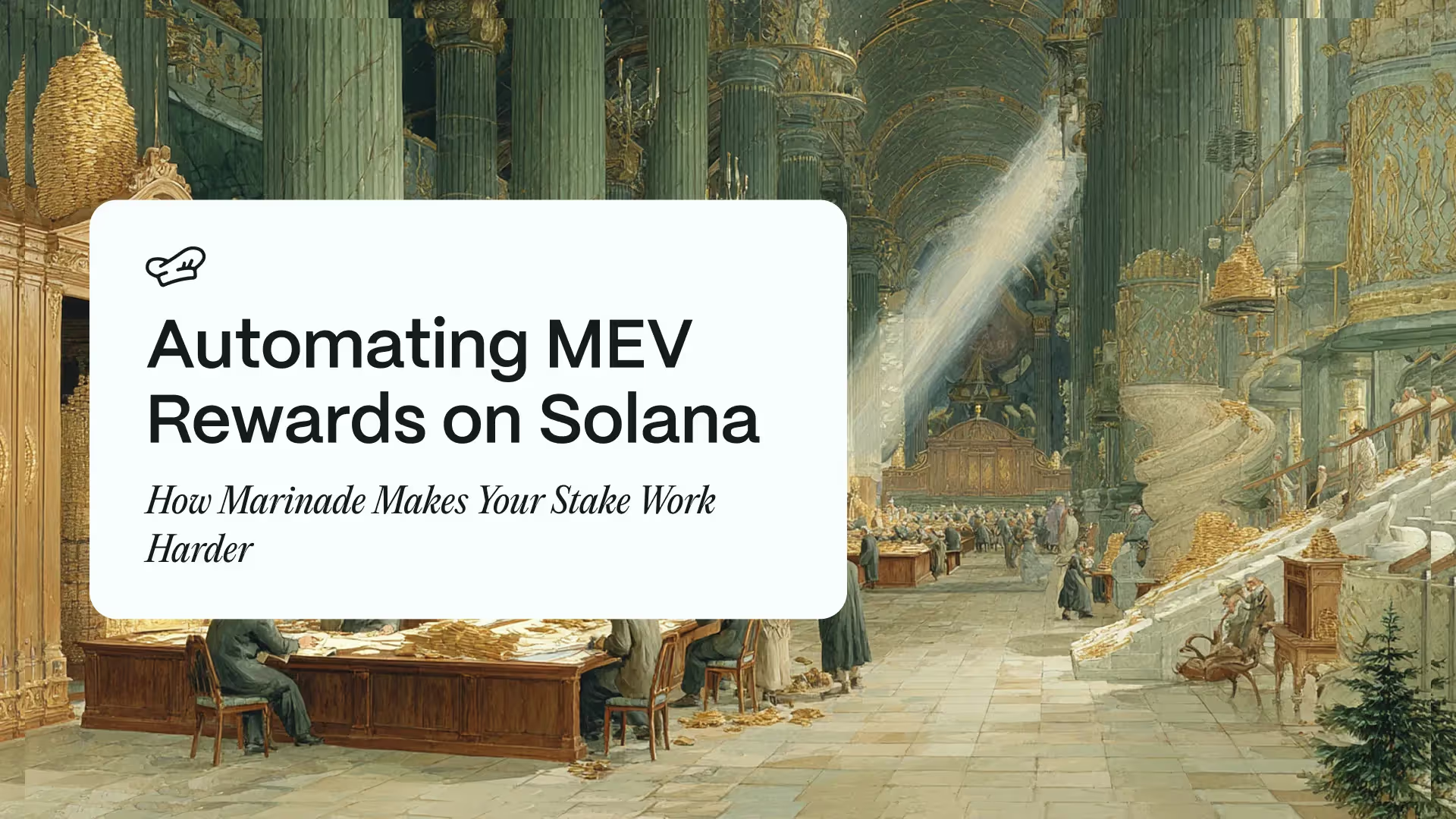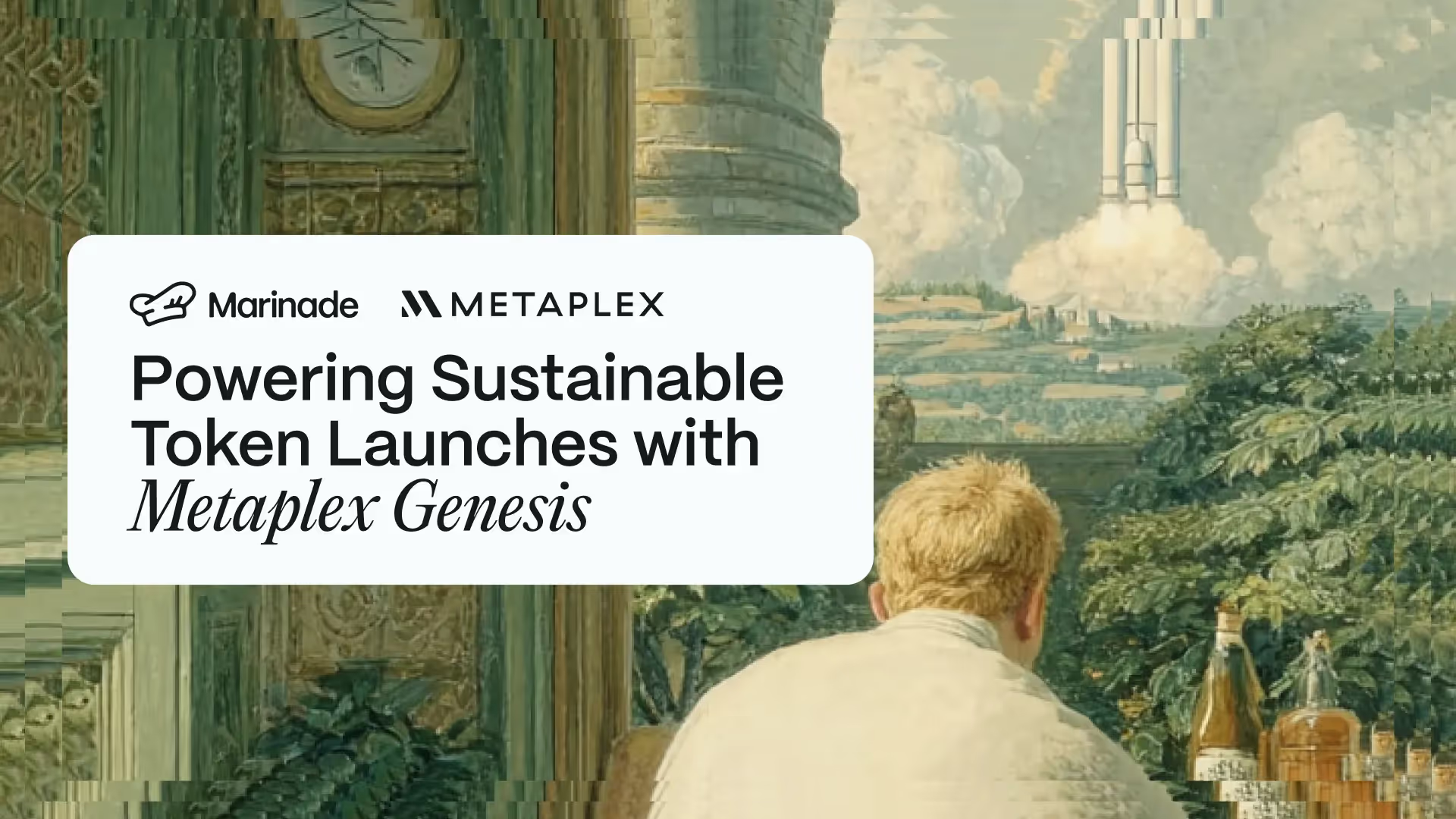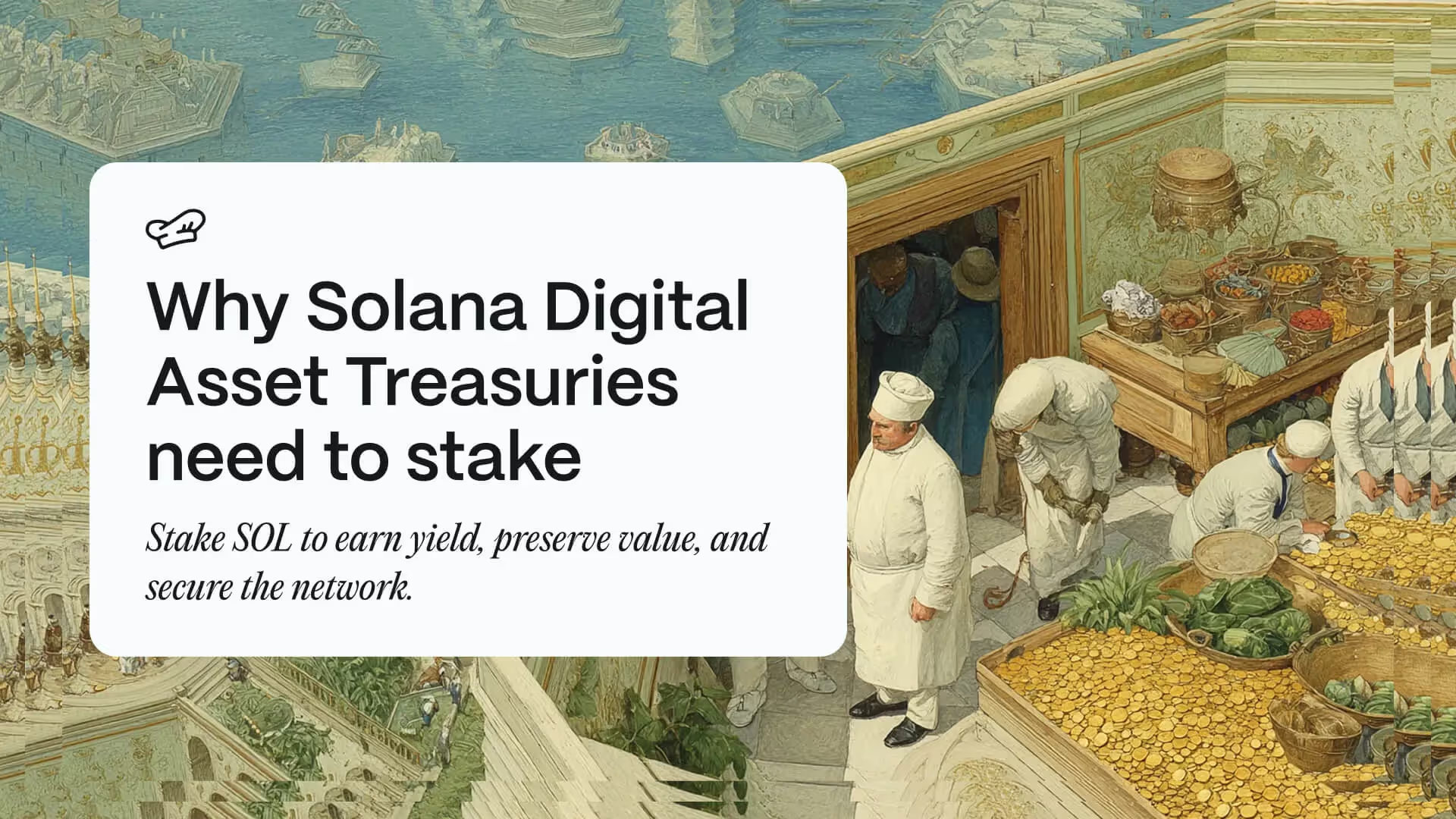The state of Marinade in the wake of FTX-Alameda
In the wake of the FTX/Alameda collapse, let's assess where Marinade stands.

Not long after all the excitement and collaboration at Breakpoint, Marinade and many other Solana builders were hit with a new reality. The FTX-Alameda collapse had brought fear and uncertainty back into crypto. It puts the spotlight once again on nefarious actors taking advantage of their centralized entities rather than why Marinade is here: Joining a community of builders collaborating in an open-source and permissionless environment to bring opportunity to all.
Marinade has believed since its inception that a community-focused and transparent approach is the best way forward for Solana. While FTX-Alameda played a large part in the early days of the ecosystem, their recent involvement with leading projects like Marinade has been minimal. In the wake of their collapse, Marinade would like to provide a transparent account of the state of the protocol, its exposure to FTX and Alameda, and our commitment to serving as a leading, community-led project for the future of the ecosystem.
Protocol and mSOL performance during Epoch 370
On November 9th as word spread of FTX insolvency, significant sell and unstaking volume took place on Solana and central exchanges. Using on-chain tools such as Solana Compass, onlookers could identify a substantial amount of stake set to be unlocked at the end of Epoch 370. This caused a considerable amount of SOL and mSOL holders to unstake and initiate selling pressure on exchanges.
While swapping mSOL for SOL on the DEX market for many users has typically been the best way to get SOL instantly for mSOL with minimal slippage, a crunch on SOL liquidity, felt at Marinade and throughout DeFi, meant slippage had considerably grown beyond normal range.
Marinade’s liquid unstake function earned significantly more fees (824 mSOL on this function alone) than normal during this time until the pool ran out.
The pool has since returned to a positive amount of about ~140,000 SOL (traditional targets in this pool is usually closer to 400–500,000 SOL. As long as there is more than 100,000 SOL in the pool, the fee for instant unstake is 0.3%. View the docs to learn more). MNDE Liquidity Mining incentives for this pool are currently high which helps contribute to an attractive APY of both pool rewards and mining incentives. To view current the rates and supply, go to the DeFi page.
The price appreciation of mSOL vs. SOL is a direct result of the staking rewards that go into the Marinade pool, and continues to grow as expected each epoch. Those who “delayed unstake” at Epoch 370 or since have received the exact amount of exchange as expected with no fee (currently 1 mSOL ≈ 1.07496 SOL).
For more performance data and details around epoch 370, click here to read the Solana Foundation’s fact sheet on the events that transpired, exposure to FTX-Alameda investment and the network performance.
Marinade’s exposure to Alameda & Serum
Marinade was founded primarily by grants totaling $80,000 from the Solana Foundation and Project Serum during the 2021 Solana x Serum Hackathon. These were grants to build the liquid staking product and neither entity has any long-term investment or governance from these grants. Marinade’s MNDE governance token was fair-launched in October, 2021 with no Initial Coin Offering. Alameda did not participate in Marinade’s Token Exchange Program that took place earlier in 2022.
Marinade is aware that Alameda mined MNDE from the launch and holds some tokens, and has also contributed SOL to the liquid unstake pool and held mSOL. The exact size or state of their positions is unknown.
Marinade DAO’s Multi-Sig: Marinade has an 11-signee main multisig that requires six signatures to activate the upgrade authority of the smart contract. Two of these signees from the beginning are Serum and Alemeda. In light of the recent news, including the potential security breach of Serum, Marinade has identified and confirmed replacements for these two wallets with trusted and active partners in the ecosystem. Marinade is also taking this opportunity to replace the Saber signer as well. These three signers are being replaced by ecosystem players who demonstrate a dedication to Solana: Staking Facilities, Mango Markets and Phantom. Learn more about Marinade’s multisig in the docs.
mSOL on FTX.com: mSOL was a tradable asset on FTX.com (not FTX.us) and in the wake of the alleged hack of the platform, this mSOL is now in a new wallet. mSOL is permissionless and no one on the Marinade team can freeze these tokens (like how centralized entities USDC or USDT may be able to freeze these tokens when complying with authorities). At publication, there are currently ~192,000 mSOL tokens in this wallet, which can be viewed here.
Solana validators and stake pool delegation
The overall Marinade stake pool has decreased in size following the unstake to 4.8 million SOL. This does not include SOL that has been unstaked but is not claimed yet.
The amount of unstake that occurred combined with the decline of SOL price brings a harsher reality to the validator community of Solana. During Breakpoint, there were well over 2,100 validators on the network (Nakamoto Coefficient of 30), but there has been a drop in the number of them to under 1,900 according to Solana Beach and the Nakamoto Coefficient is now 29. The number of validators Marinade stakes to has dropped to under 400. As the total SOL stake declined, combined with the tokens being less valuable on the market, it means some nodes may decide it is not economically viable to operate in these conditions.
Marinade’s delegation strategy is currently open source, but at this time, it is ultimately determined and can be changed by the Marinade core team. The team is beginning to assess the current delegation strategy in order to determine if it still fits these market conditions. Validators are invited to weigh in on the forum or in the #validators channel.
Marinade treasury impact
Marinade typically shares its latest treasury report in Kitchen Stories, but the events of FTX-Alameda have taken precedence, so here it is in clearer detail with numbers shared through October:
Prior to the FTX collapse, the month of October had shown promising results for Marinade finances with revenue approaching break-even in terms of the denomination in USDC.
During the month of October, Marinade had accumulated 2,171.5 mSOL through management fees and 119.26 mSOL through unstake fees, for a total of 2,291 mSOL (the equivalent of 80,311 USDC on November 1st).
In terms of expenses, Marinade spent 85,431 USDC and 811,242 MNDE (equivalent to 42,996 USDC) for a total of $128,427 in terms of USDC. The overall balance was -$5,120 in terms of USDC, and -$48,116 accounting for the MNDE expenses. Allocations for the team accounted for 4,255,943 MNDE.
Because Marinade gets its revenue in SOL, the drop in price has had an effect on Marinade’s long-term runway for contributors. The core team is exploring funding options, from grants to ecosystem investment via another Token Exchange round. As a bootstrapped project with no VC war chest, Marinade has always operated efficiently and intends to continue this way.
Marinade self-custodies its treasury with a 7-wallet multisig and had no funds stored with FTX. All funds held by Marinade are stored on-chain and are available at these addresses: Assets | MNDE
MNDE Liquidity Mining
1 million MNDE is distributed (or returned to the treasury) each week via liquidity mining gauges as voted on by Marinade’s 800-plus Chef NFT holders. 115M MNDE remains locked in governance through Chef NFTs. Solend, which receives the second-highest MNDE besides the Marinade treasury, has asked the mDAO to pause liquidity mining rewards at the moment, which Marinade has done. Additionally, rewards being distributed to wrapped Sollet-backed pools like soBTC are being deprecated. The mDAO is reviewing all the gauges and unused gauges will be removed (Details to follow). Chef NFT holders, now is a good time to review your gauge votes and redistribute if necessary. (View Liquidity mining gauges here)
Based on the liquidity crunch across Solana as evidenced by Marinade and DeFi partners, the mDAO is discussing the next iteration of liquidity mining as part of its governance upgrade and welcomes feedback in the #liquidity-gauges channels in Discord.
Marinade and Solana: The path forward
The FTX insolvency is the latest and largest example of the need for permissionless, transparent, and performant DeFi combined with safe and responsible fiat on- and off-ramps globally. These are all values that make up the foundation of Marinade. With the demise of FTX and Alameda, two of Solana’s greatest centralization risks have been removed. Despite the short-term market fallout and a lack of confidence from those outside the ecosystem, there are many reasons why institutions and projects began building on Solana For these projects and older ones like Marinade, the technological opportunity based on Solana’s robust blockchain architecture has not changed.
Marinade is taking this moment to emphasize decentralization and transparency as well as align with key stakeholders in the ecosystem to advance this mission. This means a commitment to open-source development and being as transparent as possible regarding any items related to the mDAO. Marinade’s program is governed by the mDAO and the majority of multisig holders are not within the Marinade team, but spread to the ecosystem. In a follow-up post, Marinade will detail its commitment to open-source development for the benefit of the Solana ecosystem.
The collapse of FTX-Alameda was also an example that the ecosystem needs more liquidity and can’t rely mainly on large, early investors. Solana is one of the most staked PoS blockchains and yet despite the ease of liquid staking, only ~3% of staked SOL is liquid. Introducing more liquidity into DeFi, and unlocking staked SOL, is a key battleground for the ecosystem to focus on.
Marinade will continue to facilitate the growth of the mDAO to the point that, a few years down the line, it will be a fully decentralized entity managed by the ecosystem via the governance token.
That journey continues today. Marinade invites all builders who share the mission of decentralization, capital efficiency, and transparency to join us in writing the new chapter of Solana.


